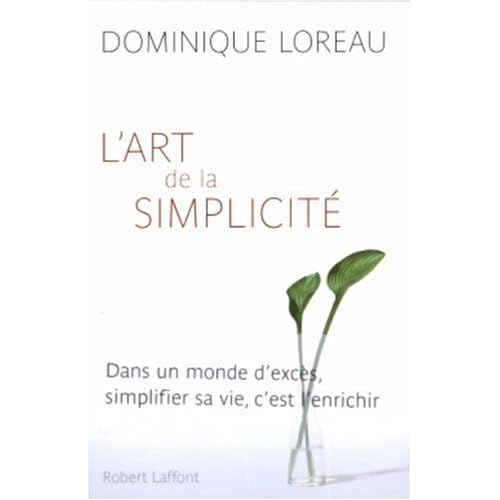I've been very interested in the theories of minimalism for quite some time now - as I explained here.
In my research to comprehend a bit more this concept, I stumbled upon a book written by the French author Dominique Loreau.
The book has been published in 2005 and is called "l'Art de la Simplicité" (the Art of Simplicity). I haven't found any English translation as of today, but I still wanted to share my opinion on this discovery.
Living in Japan, the author shares her values of simplicity and material epuration in order to be able to better appreciate the beautiful objects and open one's mind to what is really important in life.
Chapter after chapter, she reviews all aspects of everyday life: wardrobe, interior design, health and body care... How to simplify and epurate all these elements to leave space for a mind more lively than ever.
But is this not the essence of minimalism? Getting detached from the material, favour quality over quantity, enjoy what we have instead of wanting always more...
I found that book to be very insipiring as it brings a concrete application to the very abstrat concepts of minimalism I have read until now.
For example, Dominique Loreau suggests, when purchasing a piece of clothing, to imagine how to wear it with 5 different outfit we already own before settling for the purchase. Or to use only one all-purpose oil to take care of both skin and hair.
What appealed to me the most in this book, is the fact that the author lives in Japan, and says she has been influenced by the "zen aesthetics" of the country. This aestetical sense of simplicity and epuration is very present in the traditional Japanese art and culture.
| Ikebana, or how to sublime a single flower instead of losing it in the midst of a big bouquet - photo via Craikido |
However, my own experience of Japan when I lived in Tôkyô is very different from this. An environment saturated with sounds, images, plastic disposable objects and Japanese people adept to consumerism.
Dominique Loreau also acknowledges this contrast between Japanese traditional values and their modern society (in an interview in French here). She states that despite this modern consumerism, Japanese people are still much more capable to appreciate simple joys of life than most western people. Such as the art of tea, the pleasure of a hot bath...
I didn't live in Japan for long enough to verify this information, but I wonder how it is possible to associate today's consumerist society - the ads we see every day, the social pressure to buy this or that - and an active practice of "the art of simplicity". Obviously, Dominique Loreau manages to do it perfectly.
I still think that the theories of minimalism are an abstract concept difficult to apply to everyday life, but in "The Art of Simplicity", the author suggests concrete ideas to start with. The road to minimalism is long, but this was - and still is - a very good start for me.

Thank you for this recommendation. I wish it was translated to english yet. Could you write to them and ask for it? I am sure they will listen to you :)
ReplyDelete- Archana.
It's true that after all these years, they still haven't translated this book. I can try to send a request in French to the author, but I'm not sure I have that much power on their decision though :)
DeleteI have just bought a Chinese Version of this Book. Although I just read the very 1st few pages, I already think it is a very good book.
ReplyDeleteI didn't know they translated it in Chinese, very interesting!
DeleteI finished the chinese version and get back to it frequently as a reminder of living simply and purely. Love it!
ReplyDeleteIt's interesting to read the book was translated in Chinese. I wonder if an English version exists yet. I also come back to the book often to get myself motivated again with time, when I need an extra nudge to simplify my life :)
DeleteJust started reading the chinese translation. The book is really inspiring, right from the first page. I didn't know it is not available in english until i googled it.
ReplyDeleteI read this korean version and spanish version. Highly recommend!
ReplyDelete